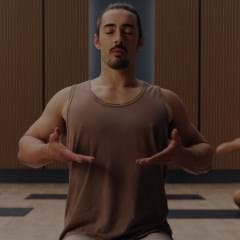Read on and you’ll discover:
- Why exercise at night can’t be blamed for sabotaging your sleep
- The science-backed benefits of exercise in the morning
- The science-backed benefits of exercise later in the day
- Why you should disregard the research and go with your gut
It’s a common belief that intense exercise at the end of the day will mess with your sleep. But research out of Australia busts that myth wide open – and even shows that evening exercise could help curb late-night cravings.
The findings come after scientists tested middle-aged men doing 30-minute high-intensity cycling workouts at different times of the day. The times tested were 6 am, 7 am, 2 pm, 4 pm, 7 pm and 9 pm. Before and after the testing, the researchers examined sleep quality and different sleep stages and took blood samples to assess levels of appetite-related hormones.
They found three interesting things:
- Those who exercised at night didn't suffer any sleep disturbance
- Those who exercised in the afternoon or evening had lower levels of ghrelin in their blood (ghrelin is the ‘hunger hormone’ that helps you regulate appetite and food intake).
- Those who worked out later in the day seemed to have more energy for their exercise.

The benefits of late-day workouts are reinforced by another Australian study, which looked at exercise timing in conjunction with diet. (This matters because earlier studies didn’t factor in diet, making it hard to isolate the effects of workout timing). The study involved sedentary, overweight men who ate a fatty diet. After introducing a varied exercise program, researchers found that participants improved their cardiovascular fitness regardless of when they exercised. However, those who trained later in the day experienced additional perks: lower cholesterol, better blood-sugar control, and enhanced cardiovascular biomarkers. These are all key indicators of improved metabolic health.
Morning vs afternoon or evening: What is the best time to work out?
While these new findings are insightful, Bryce Hastings, Les Mills Head of Research, suggests taking them with a grain of salt. He says that the most fundamental thing about choosing a workout time is to choose what feels best for you.
"By scheduling exercise for the time that works best for you, you're more likely to enjoy it. When you enjoy exercise, you stick with it, and that's where habits are born. Once exercise becomes a habit, the results really kick in."
“Sure, there’s a chance your body will burn calories differently at different times of the day, but these differences will be minimal compared to the benefit of exercising regularly. How much you benefit from exercise is closely linked to the amount of consistent physical activity you do,” he adds.
Creating consistency relies on a little trial and error. Hastings suggests trying the same workout at different times of the day. Take note of how you feel while you’re exercising and what works best with your schedule.
Try the same workout at different times of the day. Take note of how you feel while you’re exercising and what works best with your schedule.
If you still can’t establish the workout time that best suits you, here are a few standout findings to consider.

The benefits of exercise in the morning
When it comes to establishing a habit, many people argue that morning workouts are best. By exercising early in the day, you can tick off your physical activity before any competing priorities, disturbances or excuses come into play. As a result, there's a greater chance of consistency.
Morning exercise makes exercising on an empty stomach more feasible, and research suggests you can burn more fat if you train in a fasted state. A 2025 study of male college students found that an early morning workout before breakfast can spark significantly higher fat oxidation than training at other times of the day. What's more, the elevated levels of fat oxidation can last for up to four hours post workout.
Early morning exercise may help you cement a good sleep cycle. Research indicates it can shift your circadian rhythm so that you naturally feel more alert in the morning and tired at night.
Studies also show that exercising early in the day can bolster your productivity – making you more alert, focused and energized with greater decision-making ability.
TOP TIP:
The secret to getting the most from early morning exercise is to wake refreshed, invigorated and ready to raise your heart rate. This makes a good bedtime routine essential. Working on your computer or eating late in the evening may sabotage your body's ability to sleep and make getting up that much harder.

The benefits of exercise later in the day
Exercising in the evening can be ideal for alleviating the day's stresses. If you've had plenty of opportunities to eat and fuel your body through the day, you're in a better position to push your limits and take your workout up a notch.
Physical performance, such as muscle strength, flexibility, power and endurance, can often be better in the evening, which is why some experts recommend doing strength training and HIIT workouts at night if you can.
Those who exercise in the evening can take up to 20 percent longer to reach the point of exhaustion, which suggests they can work out for longer and enjoy more fitness benefits.
Your core temperature is warmer later in the day, so you are more likely to accelerate your training without the need for a lengthy warm-up period. What's more, testosterone production (which is important for building muscle in both men and women) is shown to be greater during afternoon and evening workouts than during morning exercise.
When workouts are ticked off later in the day, it may aid metabolic health by smoothing blood-sugar spikes and may also improve heart health and the control of type 2 diabetes. There’s also evidence that evening exercise has been shown to help lessen the impact of a poor diet.
Smart workout choices can help you sleep easy. A study involving BODYBALANCE™ before bed shows this fusion of yoga and meditation can help improve sleep, boost positive feelings, and enhance recovery from mental as well as physical stress.
TOP TIP:
You don't need to wait until the evening to exercise. Many find that escaping the office for a midday workout can be invigorating. It can arm you with more energy, aid productivity and even see you through that dreaded mid-afternoon slump.

The most important thing …
Any exercise is good exercise. Doing exercise at a time that works for you is much better than doing no exercise at all. If you ever feel like your motivation is lacking, it's a good idea to aim to exercise first thing in the morning. You are far better off ticking off your workout than planning it for the afternoon and then never getting to it. And if mornings are not your thing, there's good news. There's a strong chance you can learn to become a morning person, as research suggests that over time, your body can adapt to regular training cycles.
Want to learn how to become an early morning exerciser?
Or keen to become a workout night owl?
Researchers have spent well over a year examining the science of habit formation and how to shape a workout routine with stickability. They found that strong preparation actions are key. Find out how to make these findings work for you.
FIND A WORKOUT WORK OUT ON DEMAND









